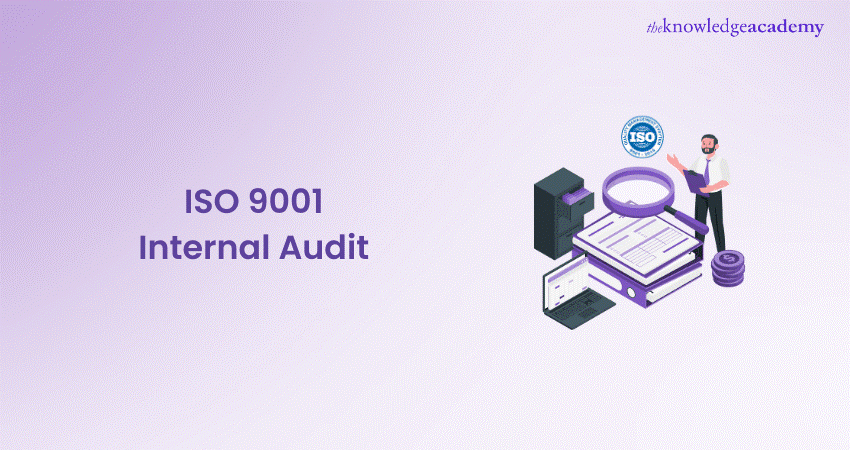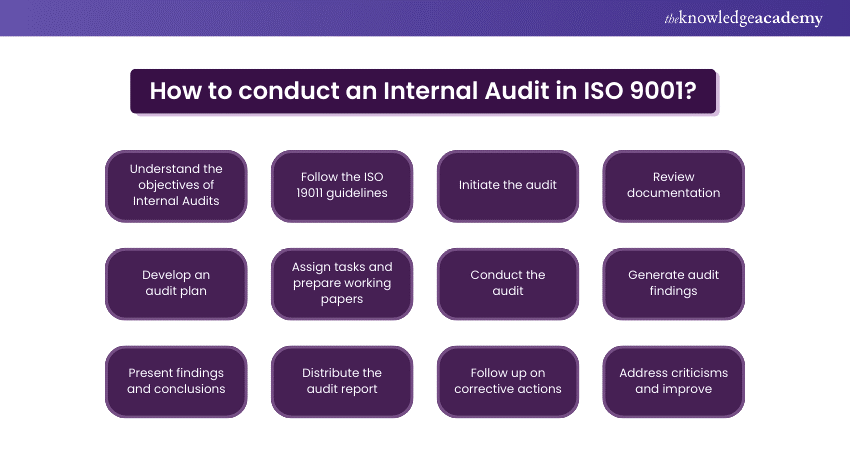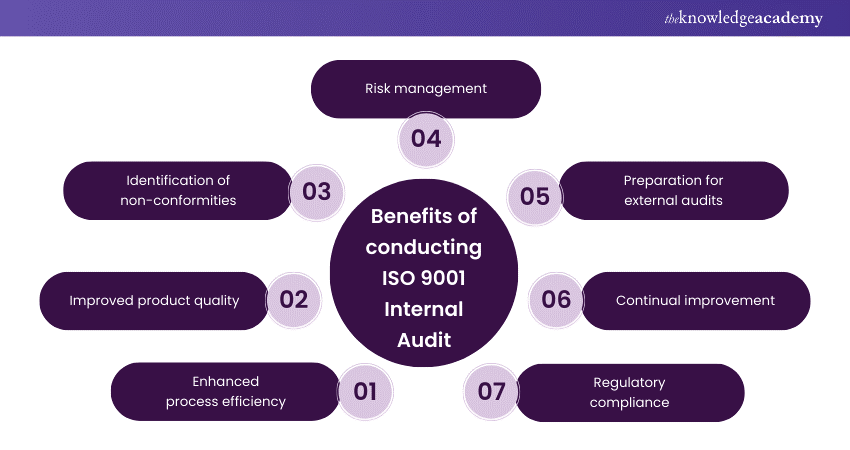We may not have the course you’re looking for. If you enquire or give us a call on 01344203999 and speak to our training experts, we may still be able to help with your training requirements.
Training Outcomes Within Your Budget!
We ensure quality, budget-alignment, and timely delivery by our expert instructors.

ISO 9001, a recognised standard for Quality Management Systems, stands as a guiding light for organisations committed to excellence. Central to this commitment is ISO 9001 Internal Audits, a dynamic process that not only ensures compliance but also fuels continuous improvement
According to ISO, in 2021, ISO 9001 had a significant global impact, where over one million organisations and 1.5 million sites achieved independent ISO 9001 Certification. In this blog, we will explore ISO 9001 Internal Audits, from understanding the fundamental principles of ISO 9001.
Table of contents
1) What is ISO 9001?
2) How to conduct an Internal Audit in ISO 9001?
3) Benefits of conducting ISO 9001 Internal Audit
4) Conclusion
What is ISO 9001?
ISO 9001 is a recognised Quality Management Systems (QMS) standard worldwide. It outlines requirements for organisations of all sizes across various sectors to enhance performance, meet customer expectations, and demonstrate a commitment to quality. The standard specifies how to establish, implement, maintain, and continually improve a QMS, focusing on process efficiency and customer satisfaction.
Organisations use ISO 9001 to consistently deliver products and services that satisfy both customer and regulatory needs. It is part of the ISO 9000 series, known for setting out the criteria for effective quality management.
How to conduct an Internal Audit in ISO 9001?
Conducting an Internal Audit in accordance with ISO 9001 involves a systematic process designed to evaluate the effectiveness of your organisation's Quality Management System (QMS). Here is a detailed guideline on how to carry out an Internal Audit based on ISO 9001 standards:

a) Understand the objectives of Internal Audits: T The purpose of Internal Audits includes the assessment of process compliance to ISO 9001 requirements, the review of the overall effectiveness in the application of the QMS, and the examination of organisational readiness towards external audits.
b) Follow the ISO 19011 guidelines: ISO 19011 provides a framework for conducting effective Internal Audits, including principles, managing an audit program, conducting the audit, and auditing competencies. It's advisable to use ISO 19011 to plan your Internal Audit process.
c) Initiate the audit: Firstly, establish the scope and purpose of your audit. Contact the process owner or department head to inform them about the upcoming audit.
d) Review documentation: Consider the company's documentation, such as its quality manual, procedures, and records, where it ensures it is in accordance with ISO 9001 standards.
e) Develop an audit plan: Create an audit plan after analysing the document, the audit action plan must indicate what will be audited, the time frame, and manpower in the timeline.
f) Assign tasks and prepare working papers: Auditing assignments should be handed over to different auditors. Meanwhile, audit work papers should be prepared to help in the efficient audit process especially for larger audits.
g) Conduct the audit: Conduct the audit in accordance with the plan and process effectiveness and then check whether the prescribed QMS is in place. Use interviewees, observation and record inspection to collect the necessary facts.
h) Generate audit findings: Document the findings, define any discrepancies between norms, propose improvements where possible, and give credit for the best practices that were identified during the audit.
i) Present findings and conclusions: The closing meeting involves the sharing of the audit findings with the auditees to determine and discuss the major points that need clarification.
j) Distribute the audit report: Prepare and send a formal draft of the audit conclusions, findings and recommendations to concerned parties as contained in the audit report.
k) Follow up on corrective actions: Supervise that the implementation of corrective actions is in place to manage the observables which are non-conformant during the audit. The audit should be followed up by checking if these measures were taken effectively.
l) Address criticisms and improve: Be aware of common criticisms of Internal Audits, such as perceived redundancy or the view of auditors as enforcers. Obtain input from the auditees to make changes in processes and demonstrate the value of Internal Audits.
Acquire in-depth knowledge of ISO 9001 and quality management standards with our ISO 9001 Lead Auditor Course – join today!
Benefits of conducting ISO 9001 Internal Audit
Conducting an ISO 9001 Internal Audits offers numerous benefits for organisations striving to improve their Quality Management System (QMS). Here are some key advantages:

a) Enhanced process efficiency: The Internal Audit consistently probes into the entity processes, rectifying whatever areas of need and achieving the required efficiency. Thereby achieving the organisation's intended goals, such as increased productivity and improved resource management.
b) Improved product quality: Through the evaluation of product quality and service performance, Internal Audit processes provide the confidence that the products and services provided are in compliance with the customer expectations and quality and safety requirements, enabling the enhancement of product quality and boosting customer service and satisfaction.
c) Identification of non-conformities: The first activity Internal Audits do is detect non-conformance in the QMS when they are minor. Initial recognition provides a chance for quick- corrective actions, resulting in fewer costs and errors.
d) Risk management: The activity brings planning a step ahead through identification and execution of serious risks, aligning with the ISO 9001's emphasis on risk-based thinking approach. This leads to a boost in the capability to withstand the operational issues and effectively adapt to the emerging trends.
e) Preparation for external audits: Internal Audit is conducted as a routine to prepare organisations for future conformity evaluation by solving potential nonconformities, which in turn reduces the likelihood of failure at the external evaluation stage.
f) Continual improvement: Internal Audits are integral to the continual improvement cycle of Plan-Do-Check-Act (PDCA). It provides objective feedback on the QMS's performance, highlighting the opportunities for continuous improvement.
g) Regulatory compliance: Routine audits are conducted to ensure that the QMS follows the ISO 9001 specifications and the license and regulatory laws to avoid legal problems and penalties associated with such matters.
Learn about the ISO 9001 standard to improve performance with our ISO 9001 Foundation Course – join today!
Conclusion
ISO 9001 Internal Audit is like quality check-ups for businesses. They help find what's working well and what needs fixing, making products or services better. These audits are not just about rules; they're about making customers happy and improving how things are done. So, remember, Internal Audits are a key to success in today’s competitive market.
Understand the importance of auditing techniques with our ISO 9001 Internal Auditor Course – join today!
Frequently Asked Questions

If you fail an ISO 9001 audit, your organisation may not receive certification or have its existing certification suspended or revoked. You will need to address the identified non-conformities and undergo a follow-up audit to verify corrective actions.

The timeframe for Internal Audit, as in the case of ISO 9001, may vary from organisation to organisation. However, these audits should be conducted annually. Some companies choose to get audited more frequently, depending on the complexity of their operating procedures.

The Knowledge Academy takes global learning to new heights, offering over 30,000 online courses across 490+ locations in 220 countries. This expansive reach ensures accessibility and convenience for learners worldwide.
Alongside our diverse Online Course Catalogue, encompassing 17 major categories, we go the extra mile by providing a plethora of free educational Online Resources like News updates, Blogs, videos, webinars, and interview questions. Tailoring learning experiences further, professionals can maximise value with customisable Course Bundles of TKA.

The Knowledge Academy’s Knowledge Pass, a prepaid voucher, adds another layer of flexibility, allowing course bookings over a 12-month period. Join us on a journey where education knows no bounds.

The Knowledge Academy offers various ISO 9001 Certification Course, including ISO 9001 Foundation Course, ISO 9001 Internal Auditor Course and ISO 9001 Lead Implementer Certification Course. These courses cater to different skill levels, providing comprehensive insights into ISO 9001 Internal Audit Sample Questions 2024.
Our ISO & Compliance Blogs cover a range of topics offering valuable resources, best practices, and industry insights. Whether you are a beginner or looking to advance your Compliance skills, The Knowledge Academy's diverse courses and informative blogs have you covered.
Upcoming Business Improvement Resources Batches & Dates
Date
 ISO 9001 Lead Auditor Course
ISO 9001 Lead Auditor Course
Mon 20th May 2024
Mon 17th Jun 2024
Mon 15th Jul 2024
Mon 19th Aug 2024
Mon 16th Sep 2024
Mon 14th Oct 2024
Mon 11th Nov 2024
Mon 16th Dec 2024







 Top Rated Course
Top Rated Course



 If you wish to make any changes to your course, please
If you wish to make any changes to your course, please


